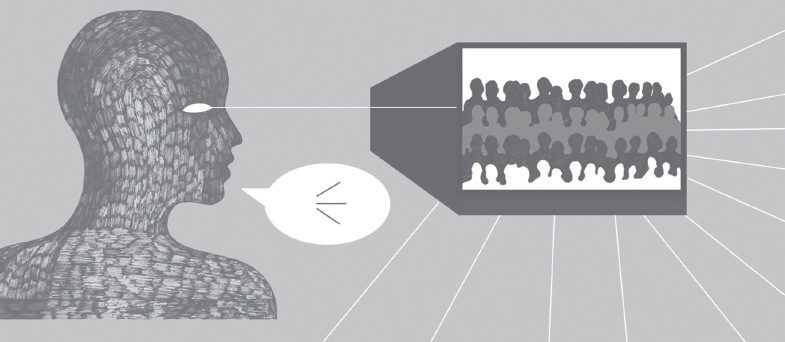


VirtualSpeech can help nervous speakers gain confidence, by enabling them to practise in front of a virtual crowd using Google Cardboard.
Public speaking can be very nerve-racking, especially for those who have had little practice at it. VirtualSpeech is a VR platform that will help inexperienced speakers gain confidence by enabling them to practise in front of a virtual crowd using Google Cardboard.
To begin, users download the app and upload their slides and notes for their upcoming project. Then they choose a training scenario — such as a 15-person office or a 400-person conference. Next, they put on their Google Cardboard headset, which immerses them in a realistic 3D environment. The user can then practise their speech or presentation to an animated audience, input by the developers using a green screen and real people portraying a range of behaviours and reactions. They can even set varying levels of sound and visual distractions, and train themselves to be accustomed to whatever situation.
Currently available on Android, iOS and Gear VR, VirtualSpeech immerses the user in 360-degree sound using the latest Oculus audio SDK, to provide as realistic an experience as possible. Alongside small and large presentation scenarios in offices or conference rooms, the app offers other scenarios. Users can practise a wedding speech in a specially tailored room, or enter a job interview room. This room gives the user the chance to practise for an interview in front of a small panel of people. Users select the job sector or company they are hoping to apply for, then cycle through question specifically designed for those scenarios. The platform currently provides 40 Google interview questions, 40 for Goldman Sachs, 20 for McKinsey and 20 for Tesla Motors. The developers expect to expand this to other companies (including Apple, Microsoft and Deloitte) and increase their database of questions.
The start-up outlines why its method of public speaking practice is more effective than methods currently available. For instance, they suggest that while practising in a full-length mirror will give you a good view of your body position, actually making a presentation in front of a mirror demands that you focus on two separate activities – the presentation and you watching yourself.
The VR practice experience is also more effective than just rehearsing in front of a friend or colleague. It can be difficult to find someone with enough time and patience to listen and give feedback. It also does not give a lifelike replication of the experience of performing to a big conference room and the fear that comes from speaking to hundreds of people at large events.
VirtualSpeech, founded in early 2015, is located in Leamington Spa, England. Alongside the Public Speaking VR app, the company is also developing a Language VR, which they hope will be a more immersive way to learn languages within realistic environments. The language app is divided into several different learning areas, including sentence building, listening to audiobooks and learning vocabulary. There are sections on culture, where users can explore England, role-play scenarios, and an awards and statistics section so that a user can keep track of their progress.
We have already seen the potential for VR to be used by surgeons to help them prepare for surgery, in the form of EchoPixel, which uses information from medical imaging to produce 3D virtual reality organs. VR could potentially change the way we rehearse, practise and train in a huge variety of industries.

__TAKEAWAYS

Website: www.virtualspeech.co.uk
Contact: www.virtualspeech.co.uk/contact
Innovation name: VirtualSpeech
Country: United Kingdom
Industries: Gamification & gaming / Workspace